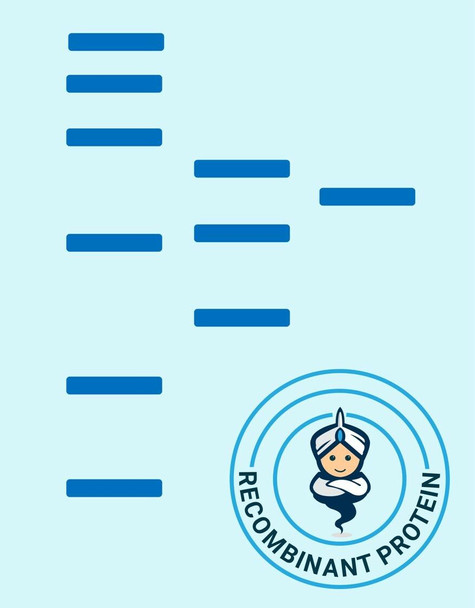Description
| Product Name: | Human HSPB8 Recombinant Protein |
| Product Code: | RPPB5256 |
| Size: | 10µg |
| Species: | Human |
| Target: | HSPB8 |
| Synonyms: | HSPB8, H11, HMN2, CMT2L, DHMN2, E2IG1, HMN2A, HSP22, Heat shock protein beta-8, Alpha-crystallin C chain, Small stress protein-like protein HSP22, E2-induced gene 1 protein, Protein kinase H11, CRYAC. |
| Source: | Escherichia Coli |
| Physical Appearance: | Sterile Filtered White lyophilized (freeze-dried) powder. |
| Formulation: | The HSPB8 protein was lyophilized from a concentrated (1mg/ml) solution containing 20mM Tris-acetate, pH-7.6, 10mM NaCl, 0.1mM EDTA, 0.1mM PMSF, 15mM b-ME. |
| Solubility: | It is recommended to reconstitute the lyophilized HSPB8 in sterile 18M-cm H2O not less than 100�g/ml, which can then be further diluted to other aqueous solutions. |
| Stability: | Lyophilized HSPB8 although stable at room temperature for 3 weeks, should be stored desiccated below -18°C. Upon reconstitution HSPB8 should be stored at 4°C between 2-7 days and for future use below -18°C.For long term storage it is recommended to add a carrier protein (0.1% HSA or BSA).Please prevent freeze-thaw cycles. |
| Purity: | Greater than 95.0% as determined by SDS-PAGE. |
HSPB8 displays temperature-dependent chaperone activity. HSPB8 acts as a mn(2+)-dependent serine-threonine- specific protein kinase. we are not convinced that this is its true role. Defects in HSPB8 are a cause of distal hereditary motor neuropathy type ii (DHMN2) also known as distal spinal muscular atrophy (DSMA) and spinal muscular atrophy of the charcot-marie-tooth type. it is an autosomal dominant disorder of lower motor neurons characterized by distal muscle weakness.
Recombinant Human Heat Shock Protein 22 kDa Protein-8 is a full-length human HSP22 with an MW of 21604 Dalton produced in E.coli.
| UniProt Protein Function: | HSPB8: Displays temperature-dependent chaperone activity. Monomer. Interacts with HSPB1. Interacts with DNAJB6. By 17-beta-estradiol. Predominantly expressed in skeletal muscle and heart. Belongs to the small heat shock protein (HSP20) family. |
| UniProt Protein Details: | Protein type:Heat shock protein Chromosomal Location of Human Ortholog: 12q24.23 Cellular Component: nucleoplasm; Golgi apparatus; cytoplasm; intracellular; nucleus Molecular Function:identical protein binding; protein binding; protein kinase activity Disease: Charcot-marie-tooth Disease, Axonal, Type 2l; Neuronopathy, Distal Hereditary Motor, Type Iia |
| NCBI Summary: | The protein encoded by this gene belongs to the superfamily of small heat-shock proteins containing a conservative alpha-crystallin domain at the C-terminal part of the molecule. The expression of this gene in induced by estrogen in estrogen receptor-positive breast cancer cells, and this protein also functions as a chaperone in association with Bag3, a stimulator of macroautophagy. Thus, this gene appears to be involved in regulation of cell proliferation, apoptosis, and carcinogenesis, and mutations in this gene have been associated with different neuromuscular diseases, including Charcot-Marie-Tooth disease. [provided by RefSeq, Jul 2008] |
| UniProt Code: | Q9UJY1 |
| NCBI GenInfo Identifier: | 13431576 |
| NCBI Gene ID: | 26353 |
| NCBI Accession: | Q9UJY1.1 |
| UniProt Secondary Accession: | Q9UJY1,Q6FIH3, Q9UKS3, B2R6A6, |
| UniProt Related Accession: | Q9UJY1 |
| Molecular Weight: | 196 |
| NCBI Full Name: | Heat shock protein beta-8 |
| NCBI Synonym Full Names: | heat shock 22kDa protein 8 |
| NCBI Official Symbol: | HSPB8�� |
| NCBI Official Synonym Symbols: | H11; HMN2; CMT2L; DHMN2; E2IG1; HMN2A; HSP22�� |
| NCBI Protein Information: | heat shock protein beta-8; protein kinase H11; alpha-crystallin C chain; E2-induced gene 1 protein; heat shock 27kDa protein 8; small stress protein-like protein HSP22 |
| UniProt Protein Name: | Heat shock protein beta-8 |
| UniProt Synonym Protein Names: | Alpha-crystallin C chain; E2-induced gene 1 protein; Protein kinase H11; Small stress protein-like protein HSP22 |
| Protein Family: | Heat shock protein |
| UniProt Gene Name: | HSPB8�� |
| UniProt Entry Name: | HSPB8_HUMAN |






